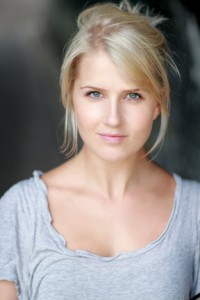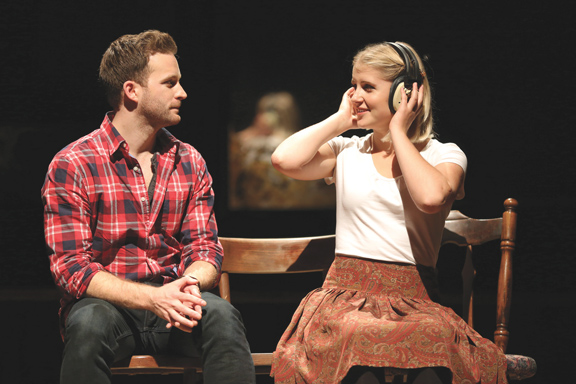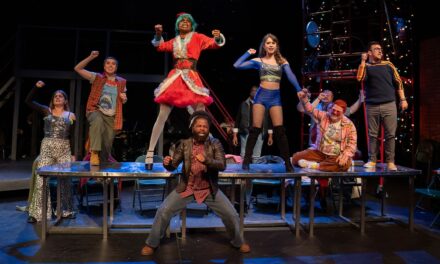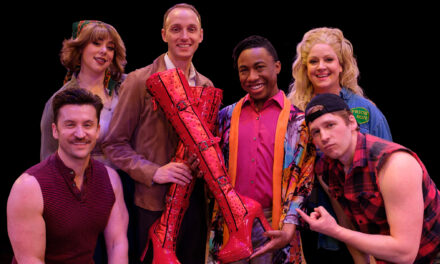Stuart Ward and Dani de Waal from the Once Tour Company, ©Joan Marcus.
Interview by Scott Dowd. Contents ©Fearless Designs, Inc. All rights reserved.
If you are one of the millions of devoted fans responsible for making Once an international cult sensation, you probably have your tickets for the upcoming PNC Broadway in Louisville presentation safely in hand. Fans know and love the music of Glen Hansard and Marketa Irglova, the singers/songwriters who created and performed the music in the 2007 film. Since its debut at the New York Theatre Workshop in 2011, the new stage adaptation of Once has won both popular and critical accolades, including Tony awards for Best Musical, Best Actor and Best Book as well as a Grammy for Best Musical Theatre Album. One of the stars of the Once national tour is Dani de Waal. A native of London, Ms. de Waal is well-acquainted with the pub culture from which grows the story of two strangers and the healing power of music.
DDW: I stud ied in London and started working in the West End. I was in Mama Mia! for one year before moving to New York, where I understudied in a play called Picnic for four months. Then I got the part of Girl in Once.
ied in London and started working in the West End. I was in Mama Mia! for one year before moving to New York, where I understudied in a play called Picnic for four months. Then I got the part of Girl in Once.
SD: So you started your career starring as Sophie in Mama Mia! That’s an auspicious beginning.
DDW: Yes. It was a great role and wonderful preparation for Once.
SD: Once is based on a film of the same name. What adaptations were required to bring it to the stage?
DDW: Although the action moves in time and space, the stage is static. It is set up as a working pub. In fact, the audience is invited to come up before the show and at intermission for a drink. The actors come out and have a jam session of Irish and Czech folk songs. We have a pool of about twenty-five to thirty songs, so if you come a couple of different nights, you’ll hear a different mix each time. That’s just what pubs are like in Great Britain – people bring along their instruments and play music.
SD: Just to be clear, we’re not inviting the audience to bring instruments and jam?
DDW: Sadly, no. But they can sit up around the musicians and be part of it in that way. It does set the mood, though, and transports them to Ireland where the story takes place.
SD: Being from Great Britain, you know the culture of pubs that American audiences won’t know. What is an Irish pub like?
DDW: Traditional pubs tend to be older. For instance, it wouldn’t be unusual for a pub in Ireland to have stood as part of the village for several hundred years. Therefore, they are usually made of and decorated with a lot of wood. They tend to be rather dark, since electricity was added later on; and they feel very cozy. It’s a reflection of village really – there may only be one pub in a village and, in many ways, it becomes the heart of the community. You see the same faces every week or every day, and you live your life together celebrating and commiserating together. In the case of Once, it provides a counterpoint to the main characters who meet there as strangers and go through that process at a highly accelerated pace.
SD: One of the features of Once is that the actors provide all of the music from the stage – there is no orchestra in the pit. What instrument do you play?
DDW: I play piano in the show. I’ve been studying piano as long as I can remember. I went to a performing arts boarding school when I was eleven, so it’s always been a part of what I was doing.
SD: In a standard musical like Guys and Dolls, the songs move the story forward. Is Once a musical or play with music like Mamma Mia!?
DDW: It is a play with music, but not like Mamma Mia! That show is a tribute to the band ABBA, and the story was constructed to provide a connection between the songs. In a musical, you generally see the characters talking; and when they can no longer express themselves with words, they break into song. Once isn’t really like that because the songs are actually part of the story. The characters are playing those instruments and singing those songs in the story. They’re not coming out of real life to sing.
SD: Can you describe the plot of Once?
DDW: The music is the reason for the story in a lot of ways. It’s their shared love of music that brings the guy and girl together in the first place. He’s an Irish busker (street musician) and she’s a Czech immigrant. She hears him singing what he thinks is his last song, because he is really in a bad way and not getting anywhere with his music or his life. He’s having a lot of personal issues and has decided to give up on his music. She hears him play the song and thinks, “I’m not going to let him do that really,” because she recognizes his gift. So they make music together. She encourages him and they make this record together – that’s the story. The music really is the driving force of the story.
SD: We’ve mentioned the condensed time period. How long are they together?
DDW: It’s a very short span from beginning to end – just five days. It moves fast and any feelings they have are occurring in a whirlwind. Initially she sees him, but she’s not thinking of him romantically. Obviously, if you have experiences that are so profound and in a creative process as they are, some feelings are bound to come into it. They find themselves in a different place than they initially thought they would be. But it’s also not a “happily ever after” boy-meets-girl event. It’s definitely a modern-day love story.
SD: Not to give the ending away, but what are your thoughts on the playwright’s choices?
DDW: Some people think it’s a sad ending, but I think it’s kind of a real ending.
SD: Once is a real departure from the kind of stories you expect to see on Broadway. There is no “Eleven O’clock” song – your character doesn’t even have a name. You are referred to in the script as simply “Girl.”
DDW: That’s right. She’s “Girl” and he’s “Guy.” There are some named characters, but there’s also “Bank Manager” and others like that. I think it’s all part of the universal nature of the story. By leaving the characters in that nebulous area, it creates the “anytime, anyplace” feeling. It’s got that storytelling feeling to it as well: “Once upon a time there was this girl and this guy and this happened.”
SD: As intimate as this show is, the playwright has kept these characters at arm’s length in a way. It reflects that post-modern distance in our society in which we experience people for the roles they play in our own stories.
DDW: That’s interesting. I’d never thought about it like that…but, yes, you’re right.
SD: In Once, you play an immigrant from the Czech Republic. Does the cultural difference between continental Europe and Great Britain play a part in this story?
DDW: I think it does. She comes from a very poor background and lives in a small apartment with four other Czechs and her daughter. He and his father live together and have a minimal relationship. He steps into her world and it’s kind of crazy. There’s music and everyone is loud and open with each other. That might be a broad statement to make about both sides. But we see in the show the differences between their lifestyles, and we’re given the idea that music is their common language.
SD: Since you are not Czech, what kind of research did you do to prepare for the role?
DDW: I tackled the dialect by myself during the audition process. I went to You Tube and dialect websites and pieced it together as much as I could. Once we started, we had a dialect coach to hone us in and get us to where we are now.
I had actually been to the Czech Republic. I went to a very picturesque town on the Vlatava River called Cesky Krumlov. It’s near the Sumava National Park, so it’s very beautiful and very rural. That’s what I keep in mind when she refers to home.
SD: Are you a method actor? Do you have to stay in character even off stage?
DDW: No, I draw from the text primarily. I try to find as much of the character in there as I can by what other characters are saying about her and how they are interacting with her. In the case of Once, it is so beautifully written that it is all there for you. So I just go from what is there.
SD: What kind of responses do you get from audiences? Has it been well received?
DDW: It has been. It reaches out to such a broad spectrum of people that there really is something for everyone. You’ll get more laughs here or there, but I haven’t found an audience yet that just didn’t get it.
SD: How long have you been on the road with this show?
DDW: I’ve been with the show exactly one year and I’m signed on for another year.
SD: People have all kinds of tricks for managing the road. How about you?
DDW: I really like getting to see so much of the country. You realize how few things you actually need, because the less you travel with, the easier it is. I’m away from family and friends, but the cast has really become that for me.
SD: How many people are in the company?
DDW: There are twelve on stage, six understudies and all the technical folks. But, because we don’t have an orchestra, that cuts down the number.
SD: Do you ever just sit around together and make music for fun?
DDW: We do. Everyone has a great love for music. We’ve done a lot of charity gigs along the road where people have done their own original music and some covers. Stuart Ward, who plays Guy, has actually released his first EP – using all musicians from the show – while we’ve been on tour. So there’s music on and off the stage all the time.
SD: The EP is a nice parallel to the story. Were you a big folk music fan before you joined the Once company?
DDW: I wouldn’t say it was my main genre, but Joni Mitchell is one of my all time favorites. I love Kate Rusby, and those are the kinds of things I’ve listened to for a long time. But I like a big, eclectic mix of music. The singer/songwriter type of music that is in the show is what I most naturally like to play for myself.
SD: Would you describe this show as family-friendly?
DDW: Yes, with the caveat that there is some adult language. I’ve seen some very young people in the audience, so it’s really up to each parent to decide. But the story and the music appeal to all ages. This is a great story for people who love music, whether or not you are a musician yourself. If music speaks to you, Once is going to be a very special experience, and I encourage everyone to come out and be part of it. This isn’t your standard night at the theatre – it’s something you will remember
for a long, long time.
Individual tickets for Once are available at The Kentucky Center box office at 502.584.7777 or at kentuckycenter.org. A special four-show package starting at just $132 includes: Once (January 20-25, 2015), Disney’s Newsies (November 18-23, 2014), The Lion King (March 3-29, 2015) and Pippin (June 2-7, 2015). To receive this special subscription rate, call 502.561.1003 or go to Louisville.broadway.com.




